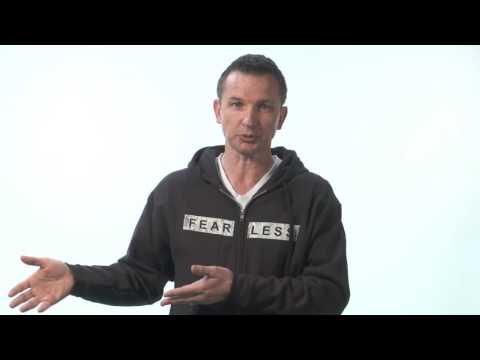 One of my passions in life is to see youth leaders succeed. I mean REALLY succeed. These men and women who have dedicated their lives to reaching and discipling young people are facing tough odds. From apathetic teenagers, to disengaged parents, to unsympathetic elder boards, to shrinking budgets, to a ticked off army of demons, youth leaders are up against some intense opposition.
One of my passions in life is to see youth leaders succeed. I mean REALLY succeed. These men and women who have dedicated their lives to reaching and discipling young people are facing tough odds. From apathetic teenagers, to disengaged parents, to unsympathetic elder boards, to shrinking budgets, to a ticked off army of demons, youth leaders are up against some intense opposition.
Cultivating these 10 habits will help youth leaders improvise, adapt and overcome.
1. Spend an inordinate amount of time in prayer.
“But Jesus often withdrew to lonely places and prayed.” Luke 5:16
If Jesus was always escaping ministry opportunities to pray, then we should too! We should pray prayers of intercession for our teenagers, families and the people we are seeking to reach with the gospel. We should spend time in prayers of supplication begging God to supply our needs. We should pray prayers of thanksgiving and offer prayers of confession.
In youth ministry praying power is staying power. And if you want to make a maximum impact in your youth ministry stay then drench it in an inordinate amount of prayer. Look at it as a key part of your job description…because it should be!
2. Work out, eat healthy, drink water and get sleep.
“Do you not know that your bodies are temples of the Holy Spirit, who is in you, whom you have received from God? You are not your own….” 1 Corinthians 6:19
You only have one body and it is on loan to you from God. You should steward it like you would your job, a bank account or your lawn. In other words we should be taking care of our bodies because it brings glory to God. But we should also take care of them because the degree of our physical health will determine the degree of our ministry stamina.
In my late 20’s I was a fat man. I had knee surgery and never completed my rehab. I walked with a limp but ate with a forklift. Every day I was tired and needed to take what I jokingly called “my fat nap.” But, through a series of events, I finally decided that enough was enough. I began to work out, eat healthy, get good sleep and drink more water.
Today, although I’m not going to compete in any marathons or CrossFit competitions, I’m relatively healthy. Although I’m 51 years old, I’m in much better shape now than I was when I was 28 years old.
By the way there’s no magic pill to getting in shape. It’s just eating right, working out and taking care of yourself. Get into this habit and you’ll feel much better and be able to endure the stresses of ministry much more effectively.
3. Give the Gospel in every talk.
“For I resolved to know nothing while I was with you except Jesus Christ and him crucified.” 1 Corinthians 2:2
If you want to see results when it comes to reaching teenagers with the gospel, then give the gospel in every one of your youth group talks. When you do, three things will happen:
First of all teenagers will come to Christ. The gospel is “the power of God for the salvation of everyone who believes” (Romans 1:16.) It’s like a grenade. Pull the pin and it will explode. Souls will be saved and lives will be changed.
Secondly, your teenagers will start inviting more friends out to youth group. Once teenagers know that you are going to give the gospel every week, they will be less hesitant to invite their yet-to-believe friends out to hear you.
Thirdly, your teenagers will be “gospelized.” They will begin to understand that the same gospel that saves the lost also sanctified the believer. Hearing the gospel relentlessly reminds us how desperately we continue to need Jesus once we are saved. We never get over our need to hear and apply the gospel message to our lives.
4. Cultivate deep friendships.
“A man of many companions may come to ruin, but there is a friend who sticks closer than a brother.” Proverbs 18:24
We all need friends who stick closer than a brother. We need someone who has our back and doesn’t put up a front. We need someone who can encourage us when we’re down, prod us when we are slow, confront us when we are in the flesh and cheer with us when we’re on a roll.
Jesus had best friends. In John 15:15 he told his disciples, “I no longer call you servants, because a servant does not know his master’s business. Instead, I have called you friends, for everything that I learned from my Father I have made known to you.“
Of the twelve, Jesus had three even closer friends, Peter, James and John. Of the three, John was the closest to Jesus. He even nicknamed himself, “the disciple whom Jesus loved” in John 13:23.
If Jesus can have best friends in ministry, so can you. Actually, it’s not a matter of “can” but “should.” We need to cultivate close friends to help us navigate through all the troubles and trials of life and ministry.
5. Read the Bible.
“I have not departed from the commandment of his lips; I have treasured the words of his mouth more than my portion of food.” Job 23:12
This may sound like a “no duh” but you may be surprised as to how many youth leaders don’t spend time in God’s Word on a consistent basis. Life gets busy and, sadly, sometimes the first thing to be cut out is time in God’s Word.
Having time for the 3 r’s (reading, reflecting and readjusting our lives based on what we’ve learned) is essential for every youth leader. God’s Word is how God speaks to us. When we read his Word we are hearing straight from God himself. As we read, the Holy Spirit illuminates passages (John 16:13), convicts us of sin and if we aren’t consistently pouring over His Word, then how can we say that we are listening to the Father?
6. Train your teenagers to be Gospel fluent.
“For what I received I passed on to you as of first importance: that Christ died for our sins according to the Scriptures, that he was buried, that he was raised on the third day according to the Scriptures…” 1 Corinthians 15:3,4
At some point the Apostle Paul received a creed from his Apostolic brothers. It simply stated the core realities of the gospel, that Jesus died for sins, was buried, rose again, was seen after his resurrection and ascended into heaven. Paul mastered this mini creed and then passed it onto the Corinthians.
In the same way, we must give our teenagers Gospel Fluency. I first heard this term from my friend David Hertweck and have been hooked on it ever since.
At Dare 2 Share we train teenagers to be gospel fluent by getting them to memorize the six key pillars of the GOSPEL message. Before you write off good old fashioned rote memory just know that it is absolutely necessary for Gospel Fluency. Think of it like chords on a guitar. You may want your teens to play jazz, but it starts with memorizing and mastering the chords. We may want our teenagers to naturally share the gospel in a winsome and compelling way (jazz), but it all starts with memorizing and mastering the basics of the gospel message (chords.)
Here are the six GOSPEL “chords” we train teenagers to master:
God created us to be with him.
Our sin separates us from God.
Sins cannot be removed by good deeds.
Paying the price for sin, Jesus died and rose again.
Everyone who trusts in him alone has eternal life.
Life with Jesus starts now and lasts forever.
For help in getting your teenagers to become Gospel Fluent, check out this one-of-a-kind resource: Life in 6 Words: The GOSPEL Explored.
7. Equip your teenagers to share the gospel.
“So Christ himself gave the apostles, the prophets, the evangelists, the pastors and teachers, to equip his people for works of service, so that the body of Christ may be built up.” Ephesians 4:11,12
Once teenagers have Gospel Gluency train them how to naturally bring it up with their friends (and even strangers), how to deal with objections and how to bring someone to a point of decision. Here’s a 4 minute crash course video that will help you do just that:

8. Tell lots and lots of changed life stories.
“On arriving there, they gathered the church together and reported all that God had done through them and how he had opened a door of faith to the Gentiles.” Acts 14:27
Storytelling has a deeper impact on developing the spiritual DNA of our teenagers than most of us can imagine. The stories we tell will help forge and form the disciples we lead.
The best influencers are often the best storytellers. Look at Jesus! He was the ultimate storyteller and his stories are still influencing us today!
For millennia, storytelling would form the courage, worldview and morals of youth people across the world. Before television and cable, kids would sit around a log fire and listen to adults regale stories of heroism, struggles and pain. They would teach through storytelling.
Today we let Hollywood tell our stories and, as a result, a group of mostly unbelieving directors are forging the morals and worldview of our young people. Hollywood defines heroism. Hollywood teaches truth. Because Hollywood tells the stories.
But I think if we can get better at storytelling and have our teenagers get better too then we can help build the worldview and get our teenagers to act!
There’s now scientific research to back it up. In an article entitled, “Why your brain loves good storytelling” by Scientist Paul J Zak in the Harvard Business Review writes that when a good story is told that creates empathy with the audience, it creates a neurochemical called “oxytocin” (pronounced “ox-ee-taw-sin”). The better and more compelling the story the more oxytocin is released and the more likely the audience is to act!
Let’s get in the habit of telling powerful changed life stories and our teenagers will be more likely to act on the mission of Jesus themselves!
9. Share your faith often.
“Do not merely listen to the word, and so deceive yourselves. Do what it says.” James 1:22
We need to be doers of the Word and not hearers only, including the area of evangelism. If Jesus’ primary mission was to “seek and to save the lost” (Luke 19:10) then shouldn’t that be our primary mission as well?
Sadly, many youth leaders will hide behind excuses like “well, I don’t have the gift of evangelism” or “I’m really more about discipleship” or “I give the gospel during our outreaches” instead of developing a habit of relational evangelism in their own lives.
And if teenagers don’t see it in us then they won’t learn it from us. That’s how the disciples learned to share their faith, from watching Jesus! From the woman at the well, to the rich young ruler, healed lepers, transformed prostitutes, and inquisitive religious leaders, Jesus was always sharing the Good News. His disciples caught what he had.
And our teenagers will catch what we have. So let’s make sure he have it by making sure evangelism is a habit!
10. Go for quantity of time (not just quality of time) with your family.
“Children are a heritage from the Lord, offspring a reward from him. Like arrows in the hands of a warrior are children born in one’s youth. Blessed is the man whose quiver is full of them. They will not be put to shame when they contend with their opponents in court.” Psalm 127:3-5
As a guy who is on the road (a lot) I have to really work hard on this area. So I don’t just go for “quality of time” but “quantity of time” as well. As I heard Pastor Stu Weber once say, quality time is a myth. Quality time just happens when you spend enough time with someone. You can’t plan it, but you can look for it and maximize it when it actually happens.
Having conversations with your wife and kids on the way to school, after watching a movie, on the way home from church or on a road trip can be times where quality time just happens. When it does, we have to seize it and squeeze every last drop of impact out of it.
This means that we must plan time with our families. Because the more we spend time together, the more quality time can unfold.
These are 10 game changing habits I’ve discovered that every youth leader should cultivate. Which ones do you agree with the most or least? Did I miss any? Share your comments below!






